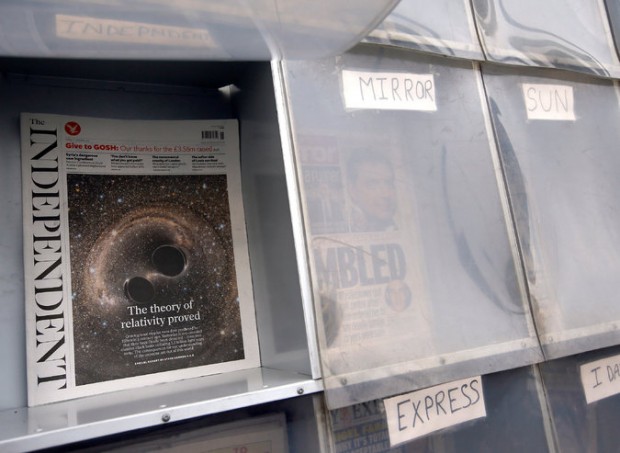Brtish news landmark, The Independent, to end its Print Edition

LONDON — The Independent, a newspaper that shook up Britain’s journalism establishment in the 1980s before falling on hard times, will stop printing after nearly 30 years and instead publish only online, its owner said Friday.
The demise of the print editions of The Independent — and its weekly counterpart, The Independent on Sunday — is a blow to Britain’s vibrant and fiercely competitive media scene, where the newspaper’s swashbuckling spirit made it an editorial force even as it struggled with losses. At its heyday in the late 1980s, it had a weekday circulation of 400,000 copies; today, it is just over 40,000.
The Independent tried to put a positive spin on its announcement, calling itself Britain’s “first national newspaper title to move to a digital-only future,” but in an internal memo, Evgeny Lebedev, who owns The Independent, said that print publication was no longer economically viable.
Instead, Mr. Lebedev said, he wanted to focus on making The Independent a global digital brand. “We faced a choice: manage the continued decline of print, or convert the digital foundation we’ve built into a sustainable, profitable future,” he wrote.
Analysts said the decision to stop printing was partly motivated by the declining sales of “i,” The Independent’s compact sister publication aimed at younger readers, which began in October 2010 and at first sold so briskly that it helped finance The Independent.
However, sales of “i” have been stagnant, and Johnston Press, a Scottish-based chain of local newspapers, said it would purchase the title for 24 million pounds, about $35 million.
Mr. Lebedev and his father, Alexander, also own The Evening Standard, a weekday tabloid in the London area that is distributed free of charge, which they acquired in 2009, a year before purchasing The Independent.
The Independent is not the only newspaper struggling in Britain. The Guardian Media Group announced last month that it was seeking to slash costs by 20 percent amid concerns over its finances. It blamed a decline in print advertising, coupled by digital revenue that was not growing quickly enough and the heavy costs of international expansion.
Founded by three journalists in 1986, The Independent became a home for talents like Robert Fisk, a longtime Middle East correspondent, and Andrew Marr, a well-known broadcaster and historian. Its alumni include the novelist Helen Fielding, whose best-seller, “Bridget Jones’s Diary,” grew out of an anonymous column she wrote for The Independent.
Journalists reacted to the demise of the print edition with a mix of pride of what had been and wistfulness at the paper’s fate. “Impossible to over-state how proud I am of the most dedicated, clever, industrious and brave staff in the history of Fleet St,” the paper’s editor, Amol Rajan, wrote on Twitter.
“The Independent: a newspaper killed by the Internet,” said a headline in the Guardian, a point that was reinforced by Richard Eden, deputy diary editor at the Daily Mail. “Moral of the day: if you want newspapers to continue being published, buy a copy,” he wrote on Twitter.
Advertisement
Continue reading the main story
Advertisement
Continue reading the main story
“Terrible, terrible day for the printed press in this country,” Aaron Sharp, deputy news editor of The Sunday Mirror, wrote on Twitter.
Roy Greenslade, a professor of journalism at City University in London, wrote in The Guardian this week that The Independent had been a pioneering newspaper. Its independent streak was reflected in its promotional slogan: “The Independent: It is, Are You?”
And Mr. Greenslade noted that the paper had prided itself on being free from the influence of proprietors. Its notable innovation — the conversion to a more compact format, in 2003 — was emulated by broadsheets across the world, including The Times of London, seeking to look more nimble and less unwieldy.
While “The Indy,” as it was commonly called, initially attracted a new generation of newspaper readers, Mr. Greenslade argued that it became overstretched when it decided, in 1990, to start a Sunday edition as an economic downturn was gathering pace. A price war instigated by Rupert Murdoch, owner of The Times and the tabloid The Sun, exacerbated the paper’s challenges.
The Independent was acquired in 1994 by two rivals, an Irish newspaper chain and the company that owns the London tabloid The Daily Mirror. Joint ownership proved divisive. Four years later, the Irish company, Independent News & Media, took full ownership, but failed to revive the title.
In 2010, its then owner, Anthony O’Reilly, sold the title to Alexander Lebedev, a former KGB agent, for £1. Independent News & Media also paid £9.25 million in return for Mr. Lebedev’s agreement to assume future liabilities and obligations.
The final print edition of The Independent on Sunday will be March 20, and the final weekday print edition will be the following Saturday, March 26.
“After 30 years,” Mr. Greenslade wrote, “the dream appears all but over.”
How to submit an Op-Ed: Libyan Express accepts opinion articles on a wide range of topics. Submissions may be sent to oped@libyanexpress.com. Please include ‘Op-Ed’ in the subject line.
- Libya’s HCS invites applicants for key state roles - December 31, 2023
- UK calls on Iran to prevent escalation in Israel-Hamas conflict - November 05, 2023
- Libyan Interior Minister: Immigrant shelter costs a fortune - November 05, 2023


